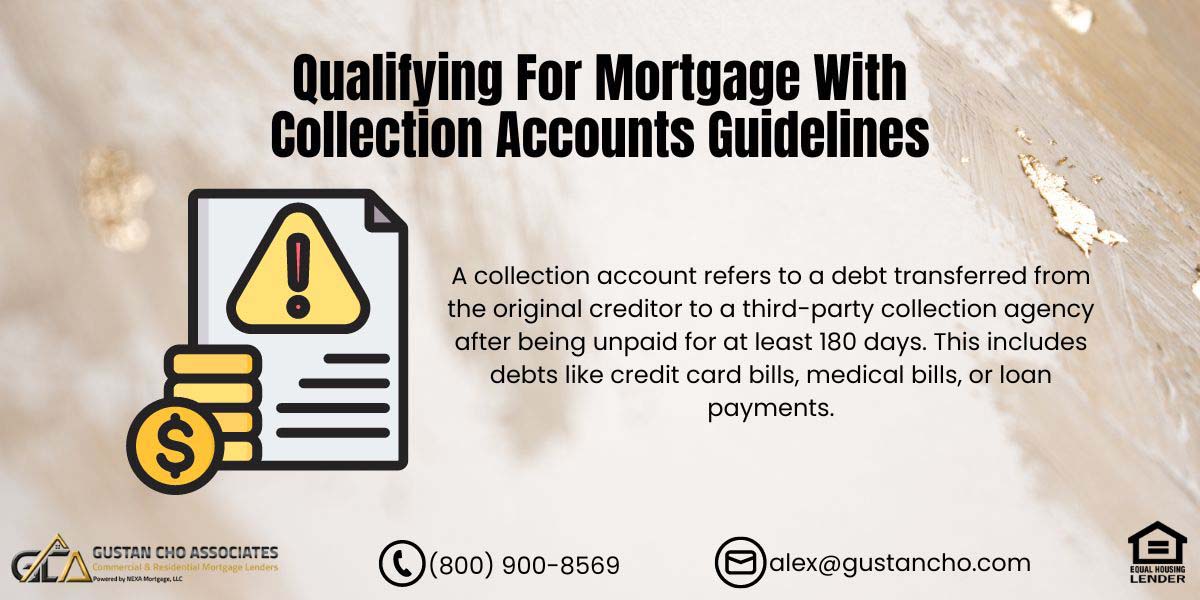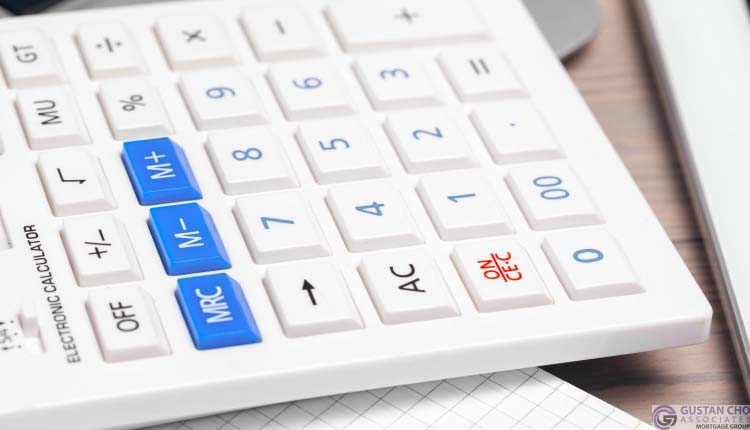In this blog, we will cover and discuss qualifying for mortgage with collection accounts guidelines. Homebuyers can qualify for a mortgage with collection accounts. HUD, the parent of FHA, has the most lenient agency mortgage guidelines than any other loan program. It is easier to get an approve/eligible per automated underwriting system (AUS) on FHA loans than in any other mortgage loan program.
Lenders can require unpaid collections and charged-off accounts to be paid off even though HUD does not require it. This is because lenders can have lender overlays on FHA loans. Lender overlays are additional mortgage guidelines that are above and beyond the minimum agency guidelines.
Qualifying for mortgage with collection accounts is allowed per agency guidelines but lenders may require them paid. In the following paragraphs, we will detail qualifying for mortgage with collection accounts and getting approved.
What is a Collection Account in Mortgage?
A collection account in the context of mortgages refers to a debt transferred from the original creditor to a third-party collection agency. This happens when a debt, such as a credit card bill, medical bill, or loan payment, has been past due for at least 180 days.
Worried About Collection Accounts? We Can Help You Qualify for a Mortgage!
Contact us today to learn about mortgage options available for borrowers with collection accounts.
Qualifying For Mortgage With Collection Accounts HUD Guidelines on FHA Loans
HUD, the parent of FHA, allows qualifying for mortgage with collection accounts. HUD does not require borrowers to pay off outstanding collection accounts in order to be eligible to qualify for an FHA-insured loan. However, most banks and many lenders will have overlays on qualifying for mortgage with collection accounts.
Lenders with overlays on collections will not approve any borrowers who have outstanding collection accounts and judgments even though the Federal Housing Administration does not require it.
Can You Get a Mortgage if You Have Some Debt?
If you have some debt, you can still qualify for a mortgage. However, lenders will pay close attention to your debt-to-income (DTI) ratio, ideally 43% or lower. This ratio represents the portion of your monthly gross income that goes towards paying off your debts, including car loans, credit card debt, car loans, and student loans.
Lenders look for consistent and timely payments, and they also take into account your credit score. Stability in employment and sufficient income can also help mitigate concerns regarding your existing debts, as these factors reassure lenders of your ability to manage new financial obligations.
A higher down payment can offset a higher DTI ratio by reducing the loan-to-value ratio. Here are a few tips on improving your chances of securing a mortgage: Calculate Your Net Income, List Your Essential Expenses, and Review and Adjust Regularly. If you need personalized advice, consulting with a mortgage advisor or lender can help you find ways to reduce your DTI ratio by paying down existing debts.
Agency Guidelines on Qualifying For Mortgage With Collection Accounts Versus Overlays by Lenders
It is not illegal for banks and lenders to have higher mortgage lending standards and requirements that surpass the minimum FHA lending requirements. HUD, the parent of FHA, classifies collection accounts into three categories:
- Non-Medical Collection Accounts
- Medical Collection Accounts
- Charge Off Accounts
Qualifying For Mortgage With Collection Accounts on Non-Medical Collection Accounts
Qualifying for mortgage with collection accounts with medical collections is often ignored by lenders with no overlays. Non-Medical Collection Accounts are any collection accounts that are not medically related such as outstanding collection accounts on credit card debts, auto repossession, utilities, cell phone carriers, and other creditors. Borrowers do not have to pay off outstanding non-medical collection accounts to qualify for an FHA loan.
Qualifying for Mortgage With Collection Accounts Guidelines on Non-Medical Collections
HUD Guidelines require lenders to take outstanding collection account balances of aggregate balances of $2,000 or greater to be included in calculating borrower’s debt to income ratios:
- 5% of the outstanding collection account balance on non-medical collection accounts needs to be figured in as part of the borrower’s monthly debt
- this holds true even though the borrower does not have to pay for it when the borrower’s debt to income ratio
- For example, if the borrower has a total of $20,000 of outstanding collection account balance from all of his or her delinquent collection accounts
- than 5% or $20,000 or $1,000 will need to be used as part of their monthly debt payments
This is the case even though they do not have to pay anything.
Have Collection Accounts on Your Credit Report? We Can Still Help You Get a Mortgage!
Reach out now to discuss your options and see how you can qualify for a mortgage.
Qualifying for Mortgage With Collection Accounts With Large Outstanding Balances
This creates a big problem for borrowers with large outstanding collection accounts. If someone makes $52,000 per year, which is $4,000 per month gross, taking that 5% of the $20,000 outstanding collection account balance, or $1,000, is a large chunk of change to use as monthly debt calculations ( 25% of total monthly gross income ). Many times, large outstanding collection accounts will disqualify borrowers from qualifying for an FHA loan due to high debt to income ratios.
Can You Include Debt in a Mortgage?
Yes, you can include debt in a mortgage, primarily through debt consolidation refinancing or a cash-out refinance. Here’s how it works:
- Debt Consolidation Refinance: Refinancing your mortgage can help pay off other debts. Calculate your net income and essential expenses to understand what you can afford monthly. Regularly review and adjust your budget to enhance financial stability and meet goals. Calculate your net income, list essential expenses, understand your monthly affordability, and align the budget with your financial objectives.
- Cash-Out Refinance: This involves refinancing for more than the existing mortgage amount and using the excess cash to pay off other debts.
- Home Equity Loans or Lines of Credit: You can borrow against the equity in your home to pay off other debts, usually at lower interest rates than other consumer debts.
These methods can simplify financial management and potentially reduce interest costs. Still, they increase your mortgage debt and put your home at risk if payments are not made. Consider all options before deciding. Consult a financial advisor to determine suitability.
Qualifying For Mortgage With Collection Accounts Solutions With High DTI
Home Buyers who have had prior bad credit and have larger outstanding collection account balances can enter into a written payment agreement with the collection agency and/or creditor. That written payment agreement can be used in the calculation of the debt to income ratios in lieu of the 5% of the outstanding collection account balance.
The good thing about this is that there is no payment history seasoning requirement. The day the borrower enters into a payment agreement with the creditor and/or collection agency, the lender will use the monthly agreed payment.
In the above example, if consumers were to enter into a $200 per month payment agreement on the $20,000 outstanding collection account balance, the $200 will be used in calculating the debt to income ratios instead of the 5% of the $20,000 or $1,000.
Qualifying For Mortgage With Collection Accounts With Medical Collections
Medical Collection accounts and charge-off accounts are exempt from debt to income ratio calculations, unlike non-medical collection accounts. No matter how much the outstanding collection account balance is on the medical collection account balance and/or charge off accounts, under the eyes of FHA, these can be exempt from debt to income ratio calculations.
There are additional FHA Guidelines On Mortgage Charge Off Accounts. Mortgage charge-off accounts will show a balance as will other charged-off accounts. All charge-off accounts will show a balance owed on the consumer’s credit report.
Although charge-off accounts are totally ignored with FHA loans, mortgage charge-offs are different. There is a three-year waiting period after a mortgage charge off account to qualify for an FHA loan. This is for both first mortgage charge off accounts and second mortgage charge off accounts.
Getting Loan Denial Qualifying For Mortgage With Collection Accounts Due To Overlays By Lender
Many borrowers go to their local banks or other lender and are told that they do not qualify for an FHA Loan due to outstanding collection accounts and charge-off accounts. A large percentage of our borrowers are folks who were told they do not qualify at other lenders due to their outstanding collection accounts and charge-off accounts.
Qualifying For Mortgage With Collection Accounts Guidelines on Mortgage Charge Offs
Many borrowers are told that they do not qualify for an FHA loan with a mortgage charge-off. The only way to qualify for an FHA loan with a mortgage charge off is to pay off the mortgage charge off account. Unfortunately, many mortgage loan originators do not know what they are talking about.
Many do not know how to read credit reports. One thing is that all charge-off accounts reporting on credit reports have an outstanding collection balance. That outstanding collection balance is the amount that is charged off. Most times a creditor cannot accept a charge off balance payoff since the debt was written off. Many lenders that want older collection account balances paid off are banks and lenders with mortgage lender overlays.
Need a Mortgage with Collection Accounts? We’re Here to Help You Qualify!
Collection accounts don’t automatically disqualify you from a mortgage. Contact us now to discuss how we can help you get the loan you need.
Do Mortgage Lenders Look at Paid Collections?
Yes, mortgage lenders typically look at your entire credit history, which includes any collections accounts, even those that have been paid off. Here’s how paid collections might affect your mortgage application:
- Credit Report: Paid collections usually remain on your credit report for up to seven years from the original delinquency date. Lenders will see these when they pull your credit report, even if they’ve been paid.
- Credit Score Impact: While paid collections still affect your credit score, recent scoring models like FICO 9 and VantageScore 3.0 and 4.0 give less weight to paid collections than unpaid ones. However, not all lenders use these newer scoring models, so the impact on your score can vary.
- Lender Considerations: Lenders look at the overall credit risk when approving a mortgage. A history of collections can be a red flag, indicating past difficulties in managing debt. However, having these accounts settled or paid might be viewed more favorably than having unpaid collections.
- Loan Approval and Terms: It’s important to note that having collections, whether paid or unpaid, can still affect the terms of a loan, including the interest rate offered. Lenders may view increased risk based on your credit history and thus require a higher down payment or offer higher interest rates.
It’s often a good idea to discuss any paid collections with your potential lenders to understand how they might view these when processing your mortgage application.
Getting Approved For a Mortgage With Outstanding Collections
Borrowers told they do not qualify with outstanding collection accounts and charge off accounts by a mortgage lender, please contact us at Gustan Cho Associates at 800-900-8569 or text us for a faster response. Or email us at alex@gustancho.com. Gustan Cho Associates is a mortgage company licensed in multiple states with no overlays on government and/or conforming loans.
Gustan Cho Associates has a national reputation for being a one-stop mortgage shop because we offer dozens of non-QM and alternative financing loan programs. Some of our most popular non-QM loan programs are bank statement mortgages, mortgages one day out of bankruptcy and foreclosure, and dozens of other non-QM mortgage programs.
FAQs About Qualifying For Mortgage With Collection Accounts Guidelines
- What is a collection account in the context of mortgages? A collection account refers to a debt transferred from the original creditor to a third-party collection agency after being unpaid for at least 180 days. This includes debts like credit card bills, medical bills, or loan payments.
- Can you qualify for a mortgage with collection accounts? Yes, you can qualify for a mortgage even with collection accounts. The HUD, the parent of FHA, allows borrowers to qualify for an FHA-insured loan without requiring outstanding collection accounts to be paid off. However, many banks and lenders implement additional guidelines (overlays). They may not approve borrowers with outstanding collection accounts and judgments.
- Can you get a mortgage if you have some debt? Yes, having debt does not automatically disqualify you from getting a mortgage. Lenders will evaluate your debt-to-income (DTI) ratio, ideally 43% or lower. They will also consider your credit score, employment stability, and income. Making a larger down payment can also mitigate a higher DTI ratio.
- How do lenders treat medical and non-medical collection accounts? FHA guidelines differentiate between medical and non-medical collection accounts. Lenders often overlook medical collections, especially if there are no lender overlays. For non-medical collection accounts with an aggregate balance of $2,000 or more, 5% is factored into the borrower’s DTI ratio.
- What is the impact of large outstanding collection balances on mortgage qualification? Large outstanding collection balances can significantly impact your DTI ratio and disqualify you from qualifying for an FHA loan. However, borrowers can enter into a payment agreement with the collection agency, and the agreed monthly payment can be used instead of calculating 5% of the outstanding balance.
- Can you include other debts in a mortgage? Yes, through debt consolidation refinancing, cash-out refinancing, or home equity loans. These methods allow you to pay off high-interest debts using the mortgage, potentially at lower interest rates. However, this increases your overall mortgage debt and puts your home at risk if payments are not maintained.
- Do mortgage lenders look at paid collections? Yes, lenders will examine your entire credit history, including paid collections. Although paid collections might be viewed more favorably than unpaid ones, they still affect your credit report. They can influence the terms of your mortgage, such as interest rates and required down payments.
- What should you do if a lender denies your mortgage application due to collection accounts? If your application is denied due to collection accounts, consider contacting a mortgage company like Gustan Cho Associates, which specializes in loans without lender overlays. They offer a variety of non-QM and alternative financing loan programs that might accommodate borrowers with complex credit histories.
This blog about Qualifying For Mortgage With Collection Accounts Guidelines was updated on May 3rd, 2024.
Collection Accounts Holding You Back? Let’s Find a Mortgage Solution That Works for You!
You can still qualify for a mortgage even with collection accounts. Reach out today to learn about your options and get on the path to homeownership.











Extremely helpful regarding calculations. I did not know that the amount of a payment agreement can be used instead of the 5% calculation for Debt to income.